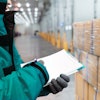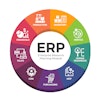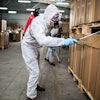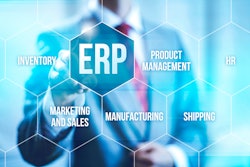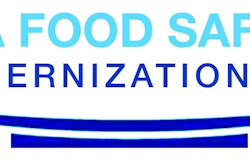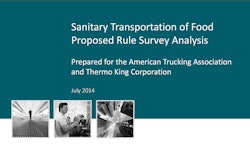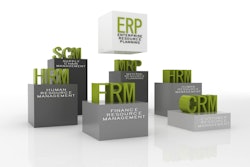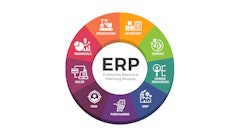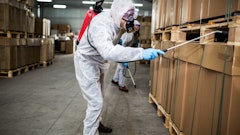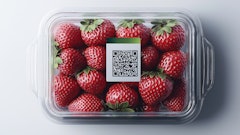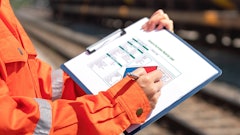
Each year, 48 million people, or 1 in 6 Americans, suffer from foodborne illness. More than 100,000 are hospitalized and thousands die, according to the Center for Disease Control and Prevention. Foods most associated with foodborne illnesses include raw foods of animal origin, e.g., raw meat and poultry, raw eggs, unpasteurized milk, and raw shellfish. Fruits and vegetables can also be contaminated with animal waste when manure is used to fertilize produce in the field, or unclean water is used for washing the produce.
In addition today’s food supply chain delivers a myriad of food types with so many container, temperature and handling requirements and so many modes of transportation available, it is easy to see that foods and food ingredients are susceptible to abuse and/or contamination during transportation and storage.
The much publicized FSMA proposed rule on Sanitary Transportation of Human and Animal foods will require those who transport food to use sanitary transportation best practices to ensure the safety of the food.
The goal of the proposed rule is to ensure that transportation practices do not create food safety risks. Practices that create such risk include:
- Failure to properly refrigerate food.
- Inadequate cleaning of vehicles between loads.
- Failure to properly protect food during transportation.
Specifically, the proposed rule would establish requirements for:
- Transportation operations.
- Information exchange.
- Record keeping.
Briefly, the requirements in these areas under the proposed rule will include:
- Documentation of the inspection of a vehicle for cleanliness prior to loading.
- Verify and document that adequate measures are taken to maintain the transportation cold chain for foods that require time/temperature control.
- Shippers must specify to carriers in writing the sanitary requirements for a vehicle or transportation equipment and shippers must maintain records to demonstrate that they provided this information to carriers.
- Carriers will be required to demonstrate to shippers and, upon request, to receivers that they have maintained appropriate temperature control for the food during the transportation operation.
- Carriers will need to provide information to shippers about previous cargo hauled in bulk vehicles used for the transportation of food and the cleaning of those vehicles.
- Carriers will need to develop and implement written procedures that describe how they will provide these items of information to shippers and receivers.
- Carriers must develop and implement written procedures that specify its practices for cleaning, sanitizing, and inspecting vehicles and transportation equipment.
ERP and food safety
Enterprise Resource Planning (ERP) solutions and information technology will play a vital role in helping to ensure shippers, receivers and carriers who transport food in the U.S. meet and maintain compliance to these regulations in the most efficient manner possible.
Systemized recording of information exchange and record keeping are particularly key to these requirements and organizations involved in the transportation of food will not only need to develop and implement best practices processes and procedures, but they will also need to record data on what happened and when – similar to the requirements for a food traceability audit solution. Modern food industry specific business management solutions coupled with mobile electronic data capture technologies provide the ideal solution for a comprehensive food safety quality assurance solution.
For example, the required shipping conditions, such as type of vehicle, vehicle preparation (cleaning, pre-cooling), temperature, packaging, etc., can all be stored electronically in a single, central database against the individual food item and/or the customer. These requirements stored as “rules” can automatically generate a series of tests and checks to be carried out by personnel during the loading and unloading operation. The tests or checks to be performed can be presented and results recorded electronically in real-time via a mobile handheld PC or tablet device, and stored directly within the ERP system for easy retrieval, reporting and full audit trail and compliance with regulations. In addition, these devices are designed to operate in challenging conditions such as shipping containers, trailers or cold storage facilities. "Store and forward" data capabilities mean that data collection can continue even when there is no data network available in remote locations.
Collaboration among parties critical
Collaboration between shippers, logistics providers and receivers will be essential to this initiative, and the sharing of data and information through electronic data and Web technologies will become the predominant method used to meet the requirement to share information between shippers, carriers and receivers on vehicle sanitary requirements, previous usage, cleaning and temperature or packing requirements.
A single, focused, centralized ERP and food safety traceability solution will provide one coherent record of the origins, movement, usage and destination of all produce throughout the entire supply chain along with a record of transportation and sanitary conditions. This data and information can then be shared to inform and drive all relevant areas of the business, such as; internal audits, Hazard Analysis and Critical Control Point (HACCP) policy requirements, quality assurance, and traceability or external supply chain audits. This data can be held centrally and captured electronically. Manual, paper-based audit processes are time consuming and carry a high risk of error and non-compliance compared with using an automated electronic data capture solution.
Other information vital to a safe and compliant supply chain; such as supplier accreditation information, labelling requirements, shelf life, storage conditions, etc., can also be centrally held within the ERP solution and automatically applied as part of operational processes.
It is important to note, that for forward-looking businesses who wish to maintain competitive advantage in a challenging market space, compliance will not only be a requirement to be fulfilled, but an opportunity to compete and excel, and the more comprehensive the solution they provide will see them gain competitive advantage with their customers. It is clear today that the most proactive business within the industry today are well aware of this and are actively investing in the latest ERP and technology solutions to be able to meet the ever increasing requirements of the market.
Consider the benefits data brings
The impact here in terms of compliance and competitive advantage can be appreciated easily. However, the advantages are not limited only to compliance. The data made available allows business managers to understand their business in far more depth, and this additional information is being used to further drive operational efficiencies and drive down costs.
Modern ERP solutions provide for real-time business intelligence reporting, Key Performance Indicators (KPI’s) and dashboards. These can be set up to further monitor progress against goals and targets and also to focus and drive personnel towards consistent achievement.
Efficiency measures include: the number of quality checks, vehicle inspections, trailer hygiene, temperature checks, target times for vehicle load, and dispatch. All of these can provide vital real-time information to ensure compliance and safeguard against errors, drive efficiency and reduce cost.
Awareness and understanding of the specific and general food safety legislation or industry requirements are important in protecting a business. The effective handling of issues arising in the supply chain, customer and consumer complaints, and being able to issue full product recall and all food safety and quality documentation with full audit trail and batch traceability is paramount.
ERPs and food recalls
Utilizing the latest ERP systems, the information required In the event of a product recall or a food safety issue can be queried and collated in minutes. Manual systems typically require hours to sort through hundreds of paper-based records, which can be inaccurate or misplaced. Time saved here is vital to ensuring the rapid identification of the cause of the issue, and that the contaminated product is pinpointed and removed from sale as quickly as possible.
Today’s food transportation organizations need to be flexible and agile. They must be able to react rapidly to changing regulatory or customer requirements. They will have eliminated time-consuming and error-prone, paper-based procedures in favor of real-time, centrally stored information. In addition, they should have well-practiced “what if” scenarios in the event of a food safety issue or emergency product withdrawal. Modern ERP facilitates the provision and implementation of these improved procedures.
In summary, a comprehensive food safety quality assurance solution facilitated using the latest ERP solutions and mobile technologies will help the food industry overall to reduce the number of product recalls due to food safety issues. This, in turn, will help reduce the risk of adverse health effects resulting from contaminated food.
In terms of environmental concerns, waste is also reduced when food reaches its final destination in pristine condition, because of the food transportation best practices applied by the shippers, carriers and receivers. When these factors are taken into account, it is clear that utilizing the latest ERP solutions can not only ensure food safety and regulatory compliance, but can also provide competitive advantage, drive business efficiency and profitability, but also address growing environmental concerns and enhance both customer, and consumer confidence and provide benefit to the industry as a whole.
